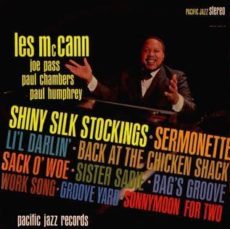
Requisites
Soul Hits ~ Les McCann | By Eddie Carter
In 1972, I was in my senior year at Glenville High School and starting my first year at Cuyahoga Community College’s Metro Campus in Cleveland, Ohio. I studied radio and had an hour-long program titled Edward Carter and All That Jazz playing albums from my library for the students and faculty on school stations, WGHS and WCCC. My goals at that time were to work at Record Rendezvous once I graduated, get my broadcast license, and become a disc jockey at Cleveland’s then jazz station, WCUY 92.3 FM. Sadly, neither of these came to fruition, but I mention it because a few nights ago, I listened to the album that became the inspiration for this morning’s discussion, and it brought back some great memories. Soul Hits (Pacific Jazz PJ-78/ST-78) by pianist Les McCann hit the stores in 1964 and is his ninth record for Richard Bock and Roy Harte’s label. His bandmates are Joe Pass on guitar, Paul Chambers on bass, and Paul Humphrey on drums. My copy used in this report is the original Stereo album.
Jimmy Smith’s Soul-Jazz classic, Back At The Chicken Shack starts Side One at a lively tempo for the quartet’s melody. Joe kicks off the solos swinging easily, then Les gives the next performance a carefree groove ahead of the closing chorus and slow fade. The beat moves upward for Sack O’ Woe by Julian Cannonball Adderley. I first heard it on The Cannonball Adderley Quintet at The Lighthouse. The ensemble crackles with energy on the opening chorus, then Pass swings like mad on an invigorating solo. McCann takes over, fanning the flames with fire on the closing statement into the out-chorus and quick fadeout. Groove Yard is by pianist Carl Perkins and was the song I used to end each radio show with. It’s a very pretty melody that’s a centerpiece for Joe on the melody, reprise, and the respectful grace he demonstrates on the song’s only solo. The trio’s interaction behind him is subtle and beautifully detailed.
Sermonette by Nat Adderley is an infectious tune with an attractive gospel-flavored rhythm by the foursome in unison. The solo order is Pass, Humphrey, and McCann, and each musician preaches an irresistible abbreviated lesson designed to have the listener clap their hands and tap their toes before a soft fade into nothingness. The first side concludes with a brisk workout of Sonnymoon For Two by Sonny Rollins. The quartet’s collective opening chorus is a sheer delight for the ears. Joe is first in the spotlight with an emotionally charged interpretation, then Les performs impressively on a brief closing statement with Chambers and Humphrey providing firm support into the coda.
Milt Jackson’s 1954 standard, Bags’ Groove (pronounced Bag’s Groove here) opens Side Two with McCann opening the song with a spirited statement of optimistic joy. Joe cruises into the melody at a comfortable speed, then the foursome disappears into darkness on a short ending. Shiny Silk Stockings aka Shiny Stockings was written by Frank Foster in 1955 and the quartet treats this young lady to a lovely night on the town with Joe delivering a relaxing theme treatment. Les takes over for a delightfully, dazzling performance preceding the foursome’s reprise and affectionate finale.
The beat moves to mid tempo for Horace Silver’s 1959 standard, Sister Sadie that premiered on Blowin’ The Blues Away that year. The quartet’s rendition is pure fun from first note to last with a danceable beat that compels you to move your feet. Joe is up first and engages the ear with a delightful performance of vivacious licks that’s a pleasure to listen to. Les gets down to business on the second solo with some home cooking that builds nicely into the closing chorus by Paul who executes a flawless interpretation convincingly before the quartet takes the tune out.
The final two tracks on the album are Neal Hefti’s 1957 timeless standard Li’l Darlin’ and Nat Adderley’s contemporary classic Work Song. On Li’l Darlin’, McCann is the featured soloist, and he delivers a deeply thoughtful presentation of warm beauty with Pass providing the perfect punctuation culminating into an intimate ending. Work Song was written in 1960 and is one of Nat Adderley’s finest works as a composer. It’s also the title tune for what many feel is his best studio album. Oscar Brown, Jr. added lyrics to the instrumental and recorded it on his LP, Sin & Soul, making the song a favorite jazz standard among musicians and vocalists around the world. Pass leads the foursome through a very strong opening chorus raising the temperature to a cooking tempo on Joe’s lead solo. Paul’s bass is impeccable on the second reading and Les wraps up the album with a robust exuberance that you can move to.
Richard Bock produced and engineered Soul Hits and the sound is stunning with the incredible definition of each instrument that surrounds your perfect place to listen with sweet sounds throughout the treble, midrange, and low end. The quartet communicates a wonderful sense of delight and sheer pleasure in the music they’re making. Though out of print since the 1981 US reissue by Liberty Records, Soul Hits by Les McCann is an album of great music that’ll delight the fan discovering his music for the first time, the seasoned collector who’s a fan of piano jazz, or if you already own the record as I do, it’ll bring back some great memories!
~ Back at The Chicken Shack (Blue Note BLP 4117/BST 84117); Blowin’ The Blues Away (Blue Note BLP 4017/BST 84017); Sin & Soul (Columbia CL 1577/CS 8377); Soul Hits (Liberty Records LN-10079); The Cannonball Adderley Quintet at The Lighthouse (Riverside RLP 344/RLP 9344); Work Song (Riverside RLP 12-318/RLP-1167) – Source: Discogs.com
~ Shiny Stockings, Li’l Darlin’ – Source: JazzStandards.com
~ Bags’ Groove, Work Song – Source: Wikipedia.org © 2021 by Edward Thomas Carter
More Posts: choice,classic,collectible,collector,history,instrumental,jazz,music,piano


